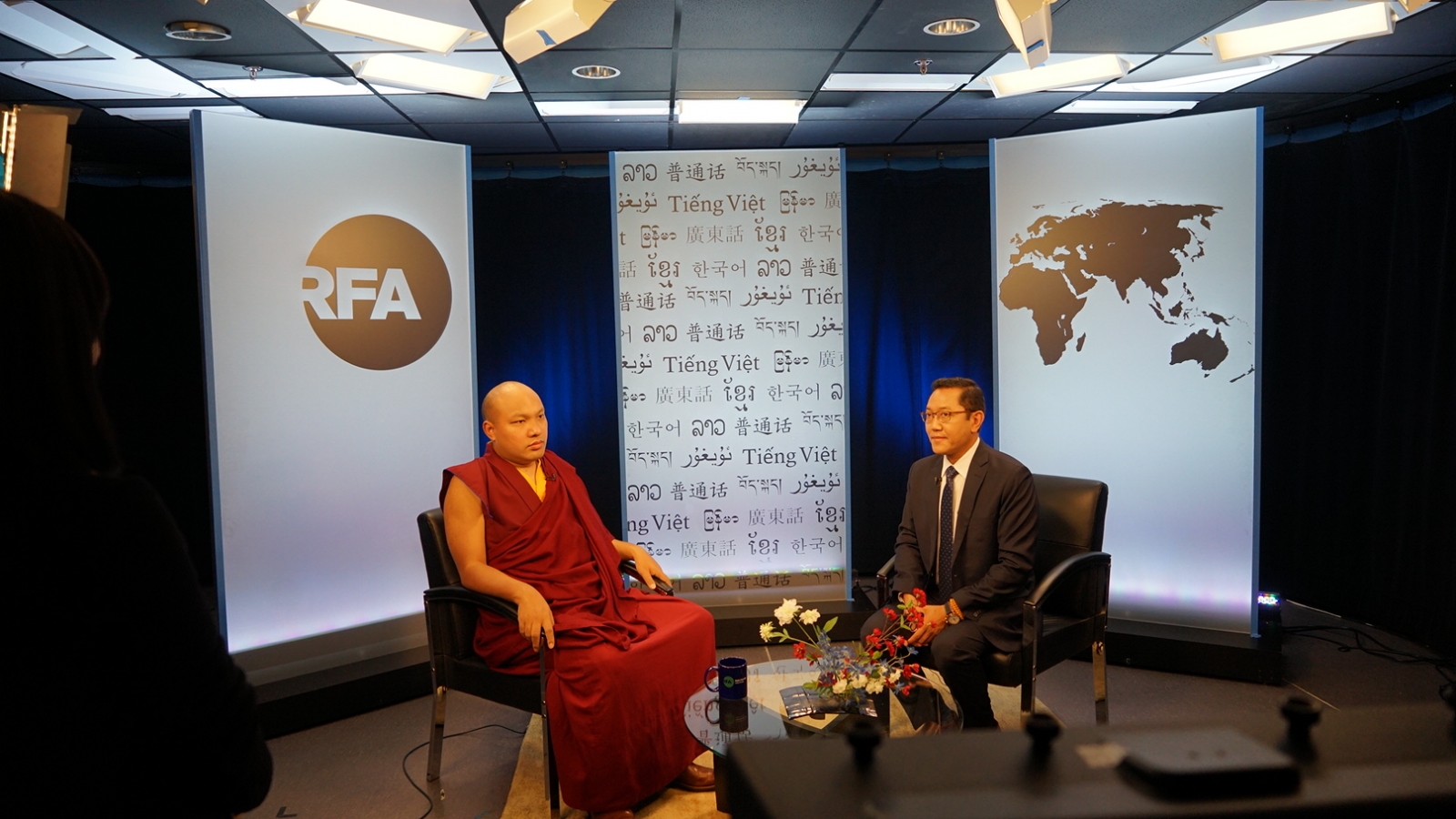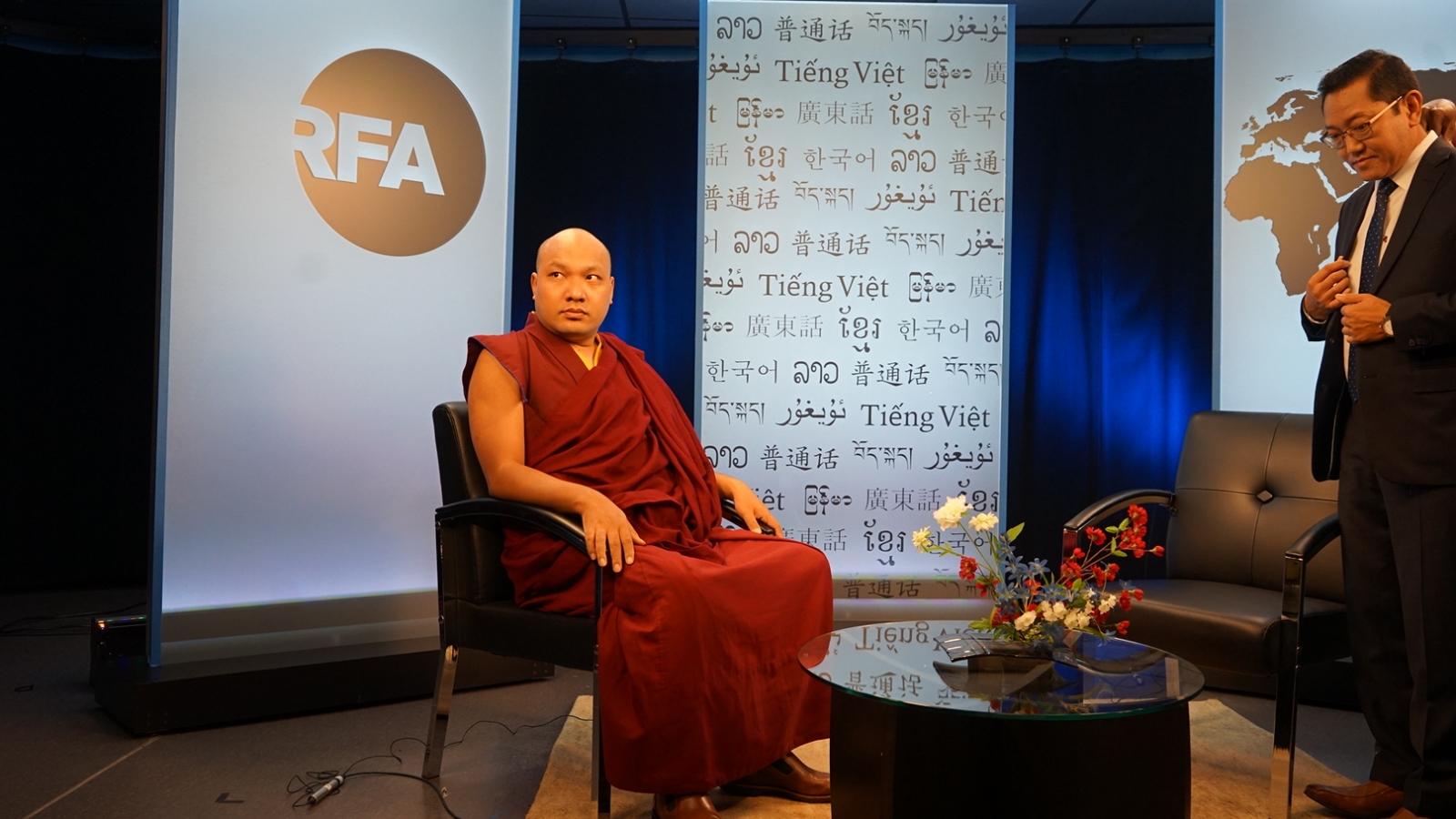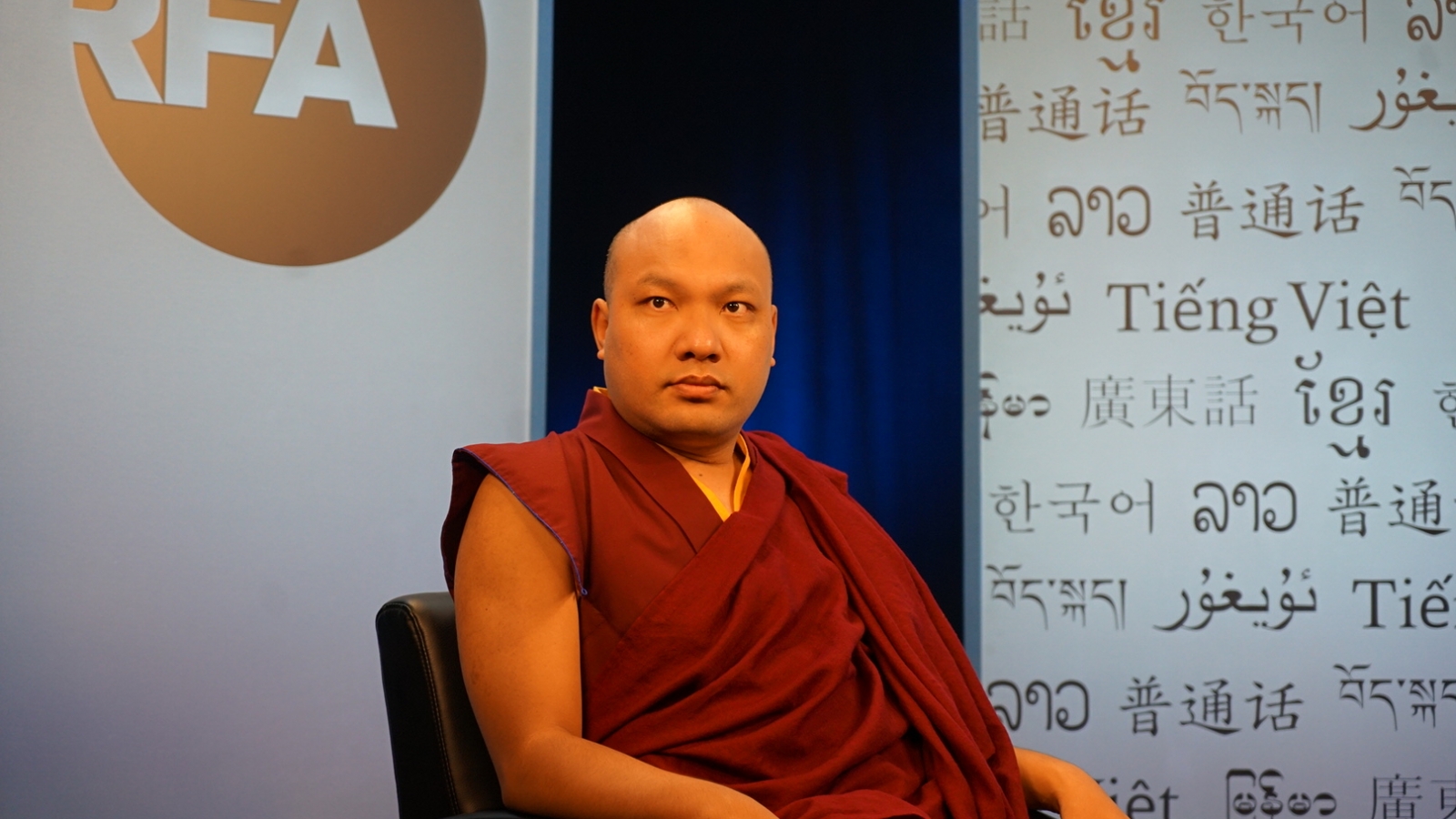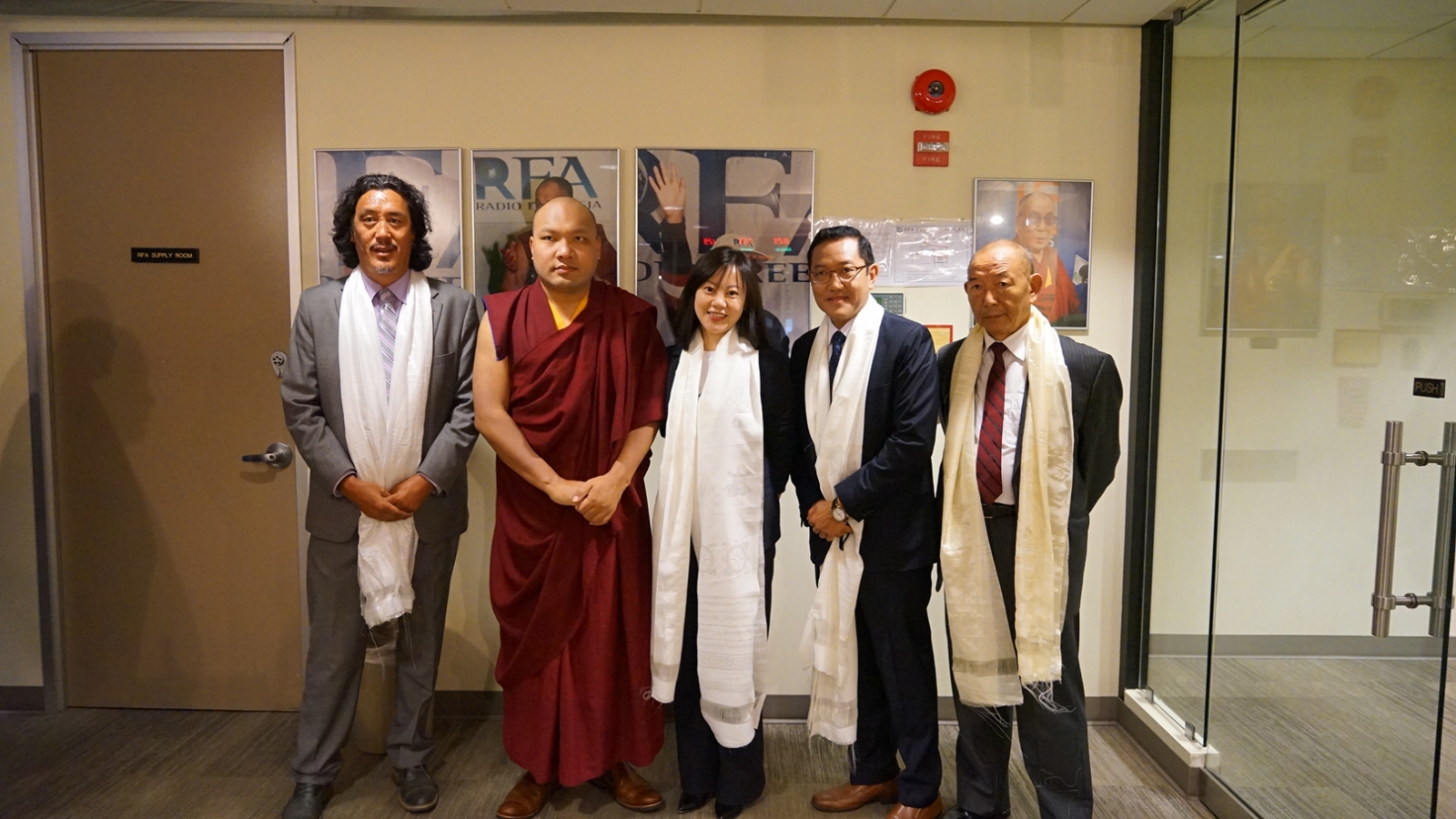Offices of Radio Free Asia, Washington, D.C.
July 30, 2018
Recently, speculation has grown around issues of the Gyalwang Karmapa’s plans and his health. During his interview on Radio Free Asia, he clarified many points. This is a slightly edited version of the dialogue.
The first question asked about the reason for his long visit to the US.
The Karmapa replied that in India, he had some issues with his health, so he came to the US for a thorough medical examination and treatment. In addition, when he was examined in a hospital in Germany, the tests indicated that there might and issue with his throat, but exams in the United States showed there was nothing major to be concerned about. The Karmapa mentioned that there was a possibility of diabetes and a small issue with his heart.
The doctors in Germany also recommended rest. “During the 18 years I have been living in India,” he commented, “I have not really had any vacation, as I was busy with a number of different matters, so I came to the US to have a complete rest as well.” He concluded, “If you ask, ‘Is this an emergency?’ No, none of my health issues are emergencies.”
The next question was about his return to India.
The Karmapa commented that there are many rumors going around, however “It is definite that I will return to India. There is no doubt about that. India has been a second home for all of us Tibetan refugees, especially His Holiness the Dalai Lama. It is like a second Tibet for us. Many important monasteries have been built in India and numerous refugee communities have been created. Further, we must not forget that India was the home of the Buddha and his teachings. Also, the main seat of the Gyalwang Karmapas, established by my predecessor, is located in India. Therefore, there is no question whatsoever that I will return.
“During the 18 years I have lived in India, many different things have happened, and the question remains of my actual situation in India, including my freedom to travel. Before I return to India, I hope to have clear discussions with representatives of the Indian Government. Some rumors say that I’m going to return to China, and so forth, but these are exaggerations, based on my expressing a desire to meet with my parents.
I will return to India, once my position there has been resolved through discussions with the India government, which are in process now.”
The following question asked about the change in his situation in India from the time when he first left Tibet until now.
The Karmapa stated, “As everyone knows, there have been a lot of problems for me since I came to India, caused by various rumors and doubts, such as the suspicions of some of the members of the security services that I was sent by China, and so forth. This is one reason why I sought the opportunity for a face-to-face meeting representatives of the Indian Government.” The Karmapa commented that at last he has been able to meet with high-level government officials, which has made a significant difference and allowed change to happen based on his actual situation.
The Karmapa was then asked about when he might return to India.
I can’t say for sure exactly when I will go back, but there is a meeting of major high lamas presided over by His Holiness the Dalai Lama in November and I certainly need to return for that. Beforehand in early November, I will attend the Parliament of the World’s Religions in Toronto, Canada.”
The Karmapa continued, “India is my headquarters. It is where I live and our main office is located there. The reason I must travel is that the previous Karmapa toured the globe, creating numerous connections with many people, and I view it as my responsibility to continue nurturing these relationships. Therefore, while I wish to return and live in India, I require the opportunity to travel internationally.”
The next query was about the reason for why the Karmapa is permitted to visit Sikkim but not his seat at Rumtek.
The Karmapa answered, “I was not and am still not able to visit Rumtek because there is an ongoing lawsuit and that makes my going there somewhat problematic. Sikkim, however, poses no difficulty, so I received permission to visit from the Indian Government.” He added that the people, the ordained sangha, and the Government of Sikkim had strongly requested the Central Government for permission for him to travel to Sikkim.
The next question referenced a talk given by the Karmapa during the Kagyu Monlam events, and asked, “How will you continue to bear the great responsibilities that are yours in the future?”
The Karmapa explained, “I was recognized as the Karmapa’s reincarnation when I was seven years old, and from then onward, I have not had an ordinary life, since I must live as the Karmapa. Although I was recognized, there have been many obstacles and little of what could help me to perform the extensive activities expected of one who carries this title of the Karmapa.
“Also, as everyone knows, the Karma Kagyu split into two groups, creating a very sad situation. Since, at least in name, I am the leader of the Karma Kagyu, it is my responsibility to do as much as I can to mediate between these two sides and heal this division. It is extremely important. Since Shamar Rinpoche passed away a few years ago, there has been no opportunity to engage in discussions with him, yet I do hope to work toward a greater familiarity and harmony between the two sides and not let things stand as they are now.”
The subsequent question concerned the Marme Monlam and preserving the cultural and artistic traditions of Tibet.
The Karmapa replied, “I have loved both painting and poetry since childhood, and as other arts, they are interwoven with the Dharma. I think it is extremely important that we Tibetans preserve our traditional arts, including the theatrical arts, dance, and the visual arts. Since all of these are linked to the teachings, they become a way of communicating something of the Dharma to people who are interested in culture and the arts, but not directly in Dharma itself. We need many different ways to connect people with the teachings. This is the reason why at the conclusion of the recent North American Kagyu Monlam in New York, I brought artists from all over the world for a cultural performance. In reminding them of the excellence of their artistic traditions, this inspires young Tibetans so that they will want enjoy and preserve their own culture.”
Another question addressed the question of diverse audiences for Buddhist teachings and how to bring people into the Dharma.
The Karmapa responded, “There are many reasons why people become interested in Buddhism. The principal reason, I think, is because Buddhism is founded on reason. The Buddha counseled his monks and nuns not to accept what is said to be his teaching based on another’s authority or its being ascribed to him. Instead, he encouraged them to test it as one would analyze gold before buying it. People are also attracted to the Dharma for its emphasis on peace, loving-kindness, compassion, and bodhichitta, which inspire many individuals. Also there is especially the visible presence of many great Buddhist practitioners and masters, most notably His Holiness the Dalai Lama, who travels worldwide as do others.” The Karmapa added that although the monks and nuns are studying very well in their traditional monastic colleges, it is important that they also become familiar with modern methods of research and scholarship.
The final question was about His Holiness the Dalai Lama, who is now 83. What will happen to Tibetans within and without Tibet when he is no longer with us?
The Karmapa advised that His Holiness is in excellent health, nevertheless, we have to take advantage of his presence, because we will never again have a leader as great as he is, an example as inspiring as he is. Therefore, when I speak, I always encourage Tibetan people to follow his directions, have great concern for their cultural and spiritual heritage, and take as much responsibility as they can for the survival of the Tibetan culture. This will depend on individuals’ efforts and their ability to overcome historical divisions.






